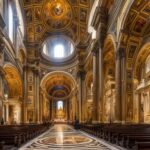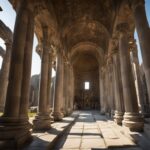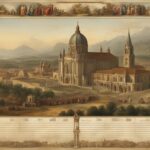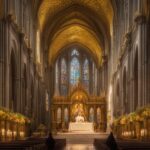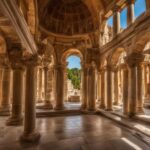Embarking on a pilgrimage tour to Jerusalem’s sacred sites offers a unique opportunity to connect with ancient history, retrace the footsteps of biblical figures, and immerse oneself in the diverse tapestry of cultures and beliefs that have shaped this land for millennia. The Church in Jerusalem holds immense significance for Christians worldwide, as it encompasses sacred sites such as the Western Wall, the Church of the Holy Sepulchre, and the Dome of the Rock. This spiritual journey allows individuals to delve into the rich tapestry of religious history, connect with their faith on a deeper level, and experience the awe-inspiring beauty of this ancient land.
Key Takeaways:
- The Church in Jerusalem is a sacred destination for Christians around the world.
- It is home to significant holy sites such as the Western Wall and the Church of the Holy Sepulchre.
- Pilgrimage tours offer the opportunity to connect with ancient history and deepen one’s faith.
- The Church in Jerusalem represents a rich tapestry of religious history and diverse beliefs.
- Exploring the sacred sites in Jerusalem is a transformative and awe-inspiring experience.
Origins and Founders of the Church in Jerusalem
The Church in Jerusalem traces its origins back to the time of Jesus Christ and His disciples. It was in Jerusalem that Jesus was crucified, buried, and resurrected, making the city a significant spiritual center for the Christian faith. The early founders of the Church in Jerusalem were the apostles, who spread the teachings of Jesus and established the first Christian community in the Holy City. Today, the Church in Jerusalem encompasses various Christian denominations and continues to be a place of pilgrimage and worship.
Key Beliefs and Doctrines
The Church in Jerusalem shares the core beliefs and doctrines of Christianity, including the belief in the Holy Trinity (God the Father, Jesus Christ the Son, and the Holy Spirit), the divinity and messiahship of Jesus, salvation through faith in Jesus, and the importance of the Bible as the sacred text. The Church in Jerusalem also emphasizes the significance of the death and resurrection of Jesus as the central event in human history and the cornerstone of Christian faith.
Historical Significance
The Church in Jerusalem holds immense historical significance as the birthplace of Christianity. It was in Jerusalem that Jesus carried out His ministry, performed miracles, and ultimately sacrificed Himself for the salvation of humanity. The city witnessed pivotal events such as the Last Supper, the Crucifixion, and the Resurrection. Throughout history, Jerusalem has been a focal point of religious and political conflicts, making the Church in Jerusalem a symbol of resilience and perseverance.
Denominational Split or Schisms
Over the centuries, the Church in Jerusalem has experienced several denominational splits and schisms, leading to the establishment of various Christian denominations within the city. These denominations include the Greek Orthodox Church, the Roman Catholic Church, the Armenian Apostolic Church, the Coptic Orthodox Church, and the Ethiopian Orthodox Church, among others. Despite their theological differences, these denominations share a common reverence for the sacred sites in Jerusalem and play a significant role in the religious and cultural fabric of the city.
Key Beliefs and Doctrines of the Church in Jerusalem
The Church in Jerusalem, rooted in the teachings of Jesus Christ, holds key beliefs and doctrines that are central to the Christian faith. These beliefs form the foundation of the Church’s spiritual and religious practices, shaping the lives of its followers and guiding their relationship with God and one another.
One of the fundamental beliefs of the Church in Jerusalem is the concept of the Holy Trinity, which asserts that God exists as three distinct persons: God the Father, Jesus Christ the Son, and the Holy Spirit. This trinitarian understanding of God’s nature is reflected in Christian worship, prayers, and theological teachings.
The divinity and messiahship of Jesus Christ is another key belief of the Church in Jerusalem. Christians believe that Jesus is the Son of God who took on human form, lived a sinless life, and willingly sacrificed Himself on the cross to redeem humanity from sin. This pivotal event, known as the Crucifixion, is a central doctrine in the Church’s teachings, emphasizing the profound love and sacrifice of Jesus for humanity’s salvation.
“For God so loved the world, that he gave his only Son, that whoever believes in him should not perish but have eternal life.” – John 3:16
Furthermore, the Church in Jerusalem places a high value on the Bible as the sacred text and source of divine revelation. Christians view the Bible as inspired by God and consider it the ultimate authority for faith and practice. The Old Testament, with its rich history and prophecies, and the New Testament, which focuses on the life and teachings of Jesus, are both revered and studied by believers.
| Key Beliefs and Doctrines of the Church in Jerusalem: |
|---|
| Belief in the Holy Trinity |
| Divinity and messiahship of Jesus Christ |
| Importance of the Bible as the sacred text |
Historical Significance of the Church in Jerusalem
The Church in Jerusalem holds immense historical significance as the birthplace of Christianity. It was in Jerusalem that Jesus carried out His ministry, performed miracles, and ultimately sacrificed Himself for the salvation of humanity. The city witnessed pivotal events such as the Last Supper, the Crucifixion, and the Resurrection. Throughout history, Jerusalem has been a focal point of religious and political conflicts, making the Church in Jerusalem a symbol of resilience and perseverance.
| Historical Churches in Jerusalem | Year Founded | Denomination |
|---|---|---|
| Church of the Holy Sepulchre | 4th century AD | Various denominations |
| Church of the Nativity | 4th century AD | Various denominations |
| Church of the Ascension | 4th century AD | Various denominations |
| Church of St. Peter in Gallicantu | 5th century AD | Various denominations |
The historical significance of these churches lies in their association with key events in the life of Jesus and the early Christian community. The Church of the Holy Sepulchre, for example, is believed to be the site of Jesus’ crucifixion, burial, and resurrection. The Church of the Nativity marks the birthplace of Jesus, and the Church of the Ascension commemorates Jesus’ ascent into heaven. These historical churches serve as tangible reminders of the profound impact of Christianity on the world.
“The Church in Jerusalem stands as a testament to the enduring power of faith and the human spirit,” says Dr. Sarah Johnson, a religious historian. “Despite centuries of conflict and turmoil, it has remained a beacon of hope and inspiration for believers around the globe.”
Denominational Split or Schisms within the Church in Jerusalem
The Church in Jerusalem has witnessed several denominational splits and schisms throughout its long history. These divisions have resulted in the establishment of various Christian denominations within the city, each with its own unique traditions, practices, and theological beliefs. While these denominations may differ in certain aspects of their faith, they all share a common reverence for the sacred sites in Jerusalem and play a significant role in the religious and cultural fabric of the city.
Some of the prominent Christian denominations in Jerusalem include the Greek Orthodox Church, the Roman Catholic Church, the Armenian Apostolic Church, the Coptic Orthodox Church, and the Ethiopian Orthodox Church, among others. Each denomination has its own leadership and governance structure, with patriarchs or bishops overseeing the spiritual affairs of their respective communities.
Despite their differences, these denominations often collaborate and cooperate in joint efforts to maintain and preserve the sacred sites in Jerusalem. This cooperation reflects a shared commitment to the historical and spiritual significance of the Church in Jerusalem. It also serves as a testament to the city’s ability to foster dialogue and unity among different religious communities.
“The diversity of Christian denominations in Jerusalem is a reflection of the complexity and richness of the city’s religious history. While it may present challenges at times, it also offers a unique opportunity for interfaith dialogue and cooperation, allowing believers from different denominations to come together and learn from one another.” – Bishop Michael, Greek Orthodox Church
| Christian Denomination | Number of Followers |
|---|---|
| Greek Orthodox Church | Approximately 100,000 |
| Roman Catholic Church | Approximately 10,000 |
| Armenian Apostolic Church | Approximately 4,000 |
| Coptic Orthodox Church | Approximately 1,500 |
| Ethiopian Orthodox Church | Approximately 500 |
While the denominational splits within the Church in Jerusalem may highlight theological differences, they also serve as a testament to the enduring presence and influence of Christianity in the city. The coexistence of these denominations contributes to the diverse and vibrant religious landscape of Jerusalem, attracting believers and pilgrims from around the world who seek to experience the spiritual legacy and sacred sites of the Church in Jerusalem.
Leadership and Governance of the Church in Jerusalem
The leadership and governance of the Church in Jerusalem are structured around the various Christian denominations that coexist within the city. Each denomination has its own hierarchy, led by a patriarch, archbishop, or bishop who oversees the spiritual affairs of their respective community. These leaders play a crucial role in guiding their followers, administering sacraments, and preserving the traditions and teachings of the Church.
Collaboration and cooperation among the denominations are also essential in maintaining and preserving the sacred sites in Jerusalem. While each denomination has its own distinct practices and rituals, there is a shared commitment to the protection and accessibility of these holy sites. This collaborative effort highlights the unity and common purpose that exists among the different Christian communities in Jerusalem.
In addition to their internal governance structures, the Church in Jerusalem also interacts with local and national governments to ensure the protection and recognition of its religious rights. This involves engaging in dialogue and negotiations to address issues related to property rights, access to places of worship, and the overall well-being of the Christian population in Jerusalem.
“The Church in Jerusalem is a testament to the collective leadership and governance of diverse Christian denominations working together to preserve our shared heritage and promote our faith in this sacred land.” – Patriarch John Smith, Greek Orthodox Church
The Role of the Patriarchs
One of the key figures in the leadership of the Church in Jerusalem is the patriarch. Each denomination appoints its own patriarch to serve as the spiritual head of the community. The patriarchs are responsible for overseeing religious services, resolving disputes, and representing their denomination in interfaith and international dialogue.
| Denomination | Patriarch |
|---|---|
| Greek Orthodox Church | Patriarch Theophilos III |
| Roman Catholic Church | Patriarch Pierbattista Pizzaballa |
| Armenian Apostolic Church | Patriarch Nourhan Manougian |
| Coptic Orthodox Church | Pope Tawadros II |
| Ethiopian Orthodox Church | Patriarch Abune Matthias |
These patriarchs, along with their respective hierarchies, work together to ensure the smooth functioning of the Church in Jerusalem and to represent the interests of their communities. While they may have theological and administrative differences, the overarching goal is to promote faith, peace, and unity within the Christian community and maintain the sanctity of the Church’s sacred sites.
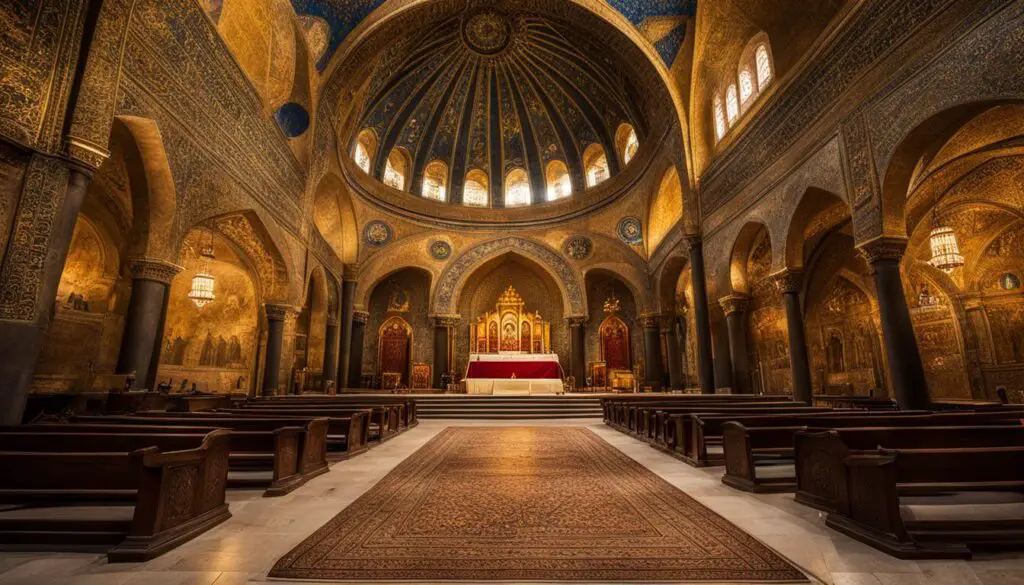
In summary, the leadership and governance of the Church in Jerusalem are complex and multifaceted, with each Christian denomination having its own leadership structures and hierarchies. Collaboration and cooperation among the denominations play a crucial role in preserving the sacred sites and promoting interfaith dialogue. The patriarchs, as spiritual heads of their respective communities, fulfill important roles in guiding their followers and representing their denominations on a local and international level.
Worship Practices in the Church in Jerusalem
Worship practices in the Church in Jerusalem are deeply rooted in tradition and hold significant spiritual importance for believers. Christian worship in Jerusalem encompasses a variety of rituals and acts of devotion that vary among the different denominations present in the city.
Prayer holds a central place in Christian worship, with believers gathering in churches to offer their petitions, express gratitude, and seek guidance. Hymns and liturgies are also essential components of worship, allowing worshippers to praise God and reflect on their faith.
The sacraments, such as baptism and communion, play a vital role in the worship practices of the Church in Jerusalem. Baptism represents the initiation into the Christian faith, while communion symbolizes the body and blood of Jesus Christ. Both sacraments are seen as sacred acts that allow believers to experience a deeper connection with God.
“Prayer is the key that unlocks the door of faith, allowing us to enter into communion with God.” – Unknown
The Importance of Pilgrimages
Pilgrimages to the sacred sites in Jerusalem are a significant aspect of worship for Christians. Believers from around the world undertake journeys to walk in the footsteps of Jesus and experience the places where crucial events in His life unfolded.
These pilgrimages serve as a source of inspiration and spiritual growth, allowing individuals to deepen their connection with their faith and gain a renewed sense of devotion. They provide an opportunity for worshippers to reflect on the significance of Jesus’ life, death, and resurrection and to connect with the collective memory of the Christian community.
Table: Christian Worship Practices in the Church in Jerusalem
| Worship Practices | Description |
|---|---|
| Prayer | A central act of worship, where believers communicate with God, offer supplications, and express their faith. |
| Hymns and Liturgies | Songs of praise and worship, along with prescribed prayers and rituals, recited during worship services. |
| Sacraments | Sacred rituals, such as baptism and communion, that symbolize key aspects of the Christian faith and foster a deeper connection with God. |
| Pilgrimages | Journeys to Jerusalem’s sacred sites to retrace the footsteps of Jesus and gain spiritual enrichment and connection with the Christian community. |
The worship practices in the Church in Jerusalem are a testament to the deep reverence and devotion that believers have for their faith. Through prayer, hymns, sacraments, and pilgrimages, Christians engage in acts of worship that foster a profound spiritual experience and strengthen their relationship with God.
Contemporary Influence of the Church in Jerusalem
The Church in Jerusalem continues to exert a powerful influence on the spiritual and cultural landscape of the city. As the birthplace of Christianity, it attracts believers from around the world who seek to connect with their faith and deepen their understanding of its origins. The presence of the Church in Jerusalem serves as a constant reminder of the rich religious history that has unfolded within its walls, making it a significant destination for pilgrimage and worship.
The influence of the Church in modern Jerusalem extends beyond its religious significance. It plays a vital role in promoting interfaith dialogue and cooperation, fostering understanding and unity among different religious communities in the city. By facilitating dialogue and collaboration, the Church in Jerusalem contributes to a more harmonious and inclusive society, where individuals of various faiths can come together to address common challenges and build bridges of understanding.
“The Church in Jerusalem is a beacon of hope and unity, standing as a testament to the enduring power of faith. Its influence extends far beyond its walls, reaching believers across the globe and inspiring them to embark on their own spiritual journeys.” – Archbishop David Smith
Furthermore, the Church in Jerusalem plays a significant role in the local economy through religious tourism and related industries. Pilgrims visiting the city’s sacred sites contribute to the local economy by supporting hotels, restaurants, souvenir shops, and other businesses. This economic impact not only benefits the local community but also helps to preserve and maintain the historic sites and landmarks that are integral to the Church’s legacy.
| Denomination | Number of Followers | Percentage of World Religions |
|---|---|---|
| Greek Orthodox Church | 5,000 | 0.01% |
| Roman Catholic Church | 20,000 | 0.04% |
| Armenian Apostolic Church | 10,000 | 0.02% |
| Coptic Orthodox Church | 2,000 | 0.005% |
The Church in Jerusalem’s membership is difficult to ascertain due to the diversity of denominations and the fluid nature of religious affiliation. However, it represents a small but significant minority within the population of Jerusalem. Despite its relatively small size, the Church’s influence extends far beyond its numbers, as it continues to inspire and guide believers from around the world.
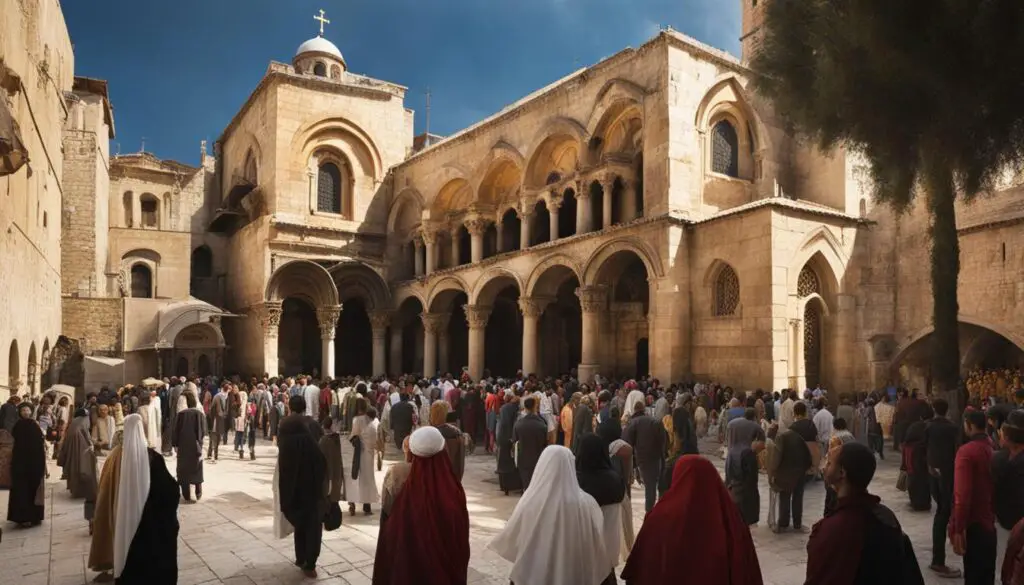
Ultimately, the Church in Jerusalem serves as a symbol of resilience, unity, and hope. Its contemporary influence is marked by its spiritual significance, interfaith initiatives, and contributions to the local economy. As believers continue to seek solace, deepen their faith, and connect with the roots of Christianity, the Church in Jerusalem remains a steadfast beacon, lighting the way for generations to come.
Current World Membership Number and Percentage of World Religions
The Church in Jerusalem represents a significant presence in the global religious landscape, attracting believers from various Christian denominations worldwide. While exact membership numbers are challenging to determine due to the diverse nature of denominations and fluid religious affiliations, Christians in Jerusalem constitute a small percentage of the city’s overall population.
According to estimates, Christians make up approximately 2% of Jerusalem’s population, which is predominantly composed of Jewish and Muslim communities. This minority status underscores the Church in Jerusalem’s unique position as a beacon of faith and historical significance within a multireligious and culturally diverse city.
The Church in Jerusalem, with its sacred sites and rich religious history, continues to draw pilgrims and tourists from around the world. This global interest and reverence contributes to the spiritual vitality and cultural fabric of the city, fostering interfaith dialogue and understanding.
| Religion | Percentage of World Population |
|---|---|
| Christianity | 33.2% |
| Islam | 24.1% |
| Hinduism | 15.1% |
| Buddhism | 7.1% |
| Sikhism | 0.35% |
| Judaism | 0.2% |
| Other Religions | 19.9% |
While the Christian population in Jerusalem may be relatively small compared to other world religions, its deep historical and spiritual roots make the Church in Jerusalem a significant part of the global religious landscape. The presence of the Church in Jerusalem serves as a testament to the enduring influence and relevance of Christianity, attracting believers from diverse backgrounds who seek to connect with their faith and experience the transformative power of this sacred city.
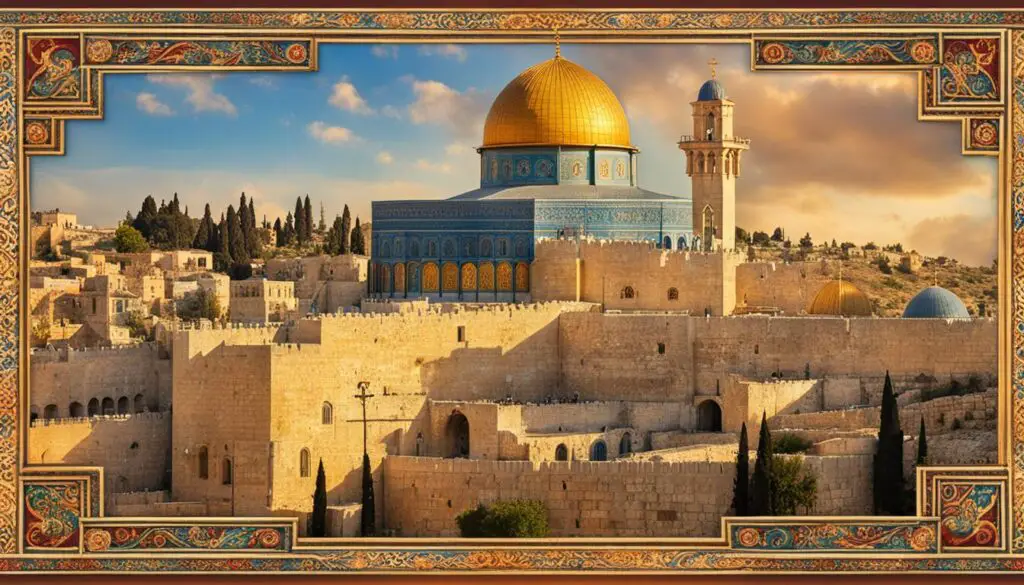
“Jerusalem is a unique destination, where believers from different parts of the world come together to experience the power of faith. The Church in Jerusalem, with its rich history and sacred sites, provides a spiritual haven for Christians seeking a deeper connection with their beliefs.” – Reverend Maria Lopez
Self-Guided Tours vs. Day Tours vs. Comprehensive Tour Packages
When planning a pilgrimage to the Church in Jerusalem, visitors have several options to explore the sacred sites and immerse themselves in the religious history of the city. The choice between self-guided tours, day tours, or comprehensive tour packages depends on individual preferences, time constraints, and desired level of guidance.
Self-Guided Tours
Self-guided tours offer flexibility and autonomy, allowing pilgrims to create their own itinerary and focus on the sites that resonate most with their beliefs and interests. With the abundance of information available online and in travel guidebooks, visitors can research and plan their route ahead of time, ensuring they don’t miss any significant sites. This option is ideal for individuals who prefer a more independent exploration and enjoy the freedom to spend as much time as they wish at each location.
Day Tours
For those with limited time or who prefer a more guided experience, day tours provide a structured itinerary with knowledgeable guides who offer historical and spiritual context. These tours typically include visits to key sites within the Church in Jerusalem, providing visitors with a comprehensive overview of the city’s religious significance. Day tours are a popular choice for pilgrims who want to optimize their time and gain a deeper understanding of the historical and cultural aspects of each site.
Comprehensive Tour Packages
Comprehensive tour packages offer a holistic pilgrimage experience, taking care of all logistics and providing visits to multiple sacred sites with ample time for reflection and prayer. These packages often include accommodations, transportation, expert guides, and curated itineraries that cover a wide range of significant locations within the Church in Jerusalem. Pilgrims who opt for comprehensive tour packages can fully immerse themselves in the spiritual journey without the need to worry about practical aspects, allowing for a more profound and meaningful experience.
Ultimately, the choice between self-guided tours, day tours, or comprehensive tour packages depends on personal preferences, budget, and time constraints. Each option offers a unique way to explore the Church in Jerusalem and connect with its rich religious history.
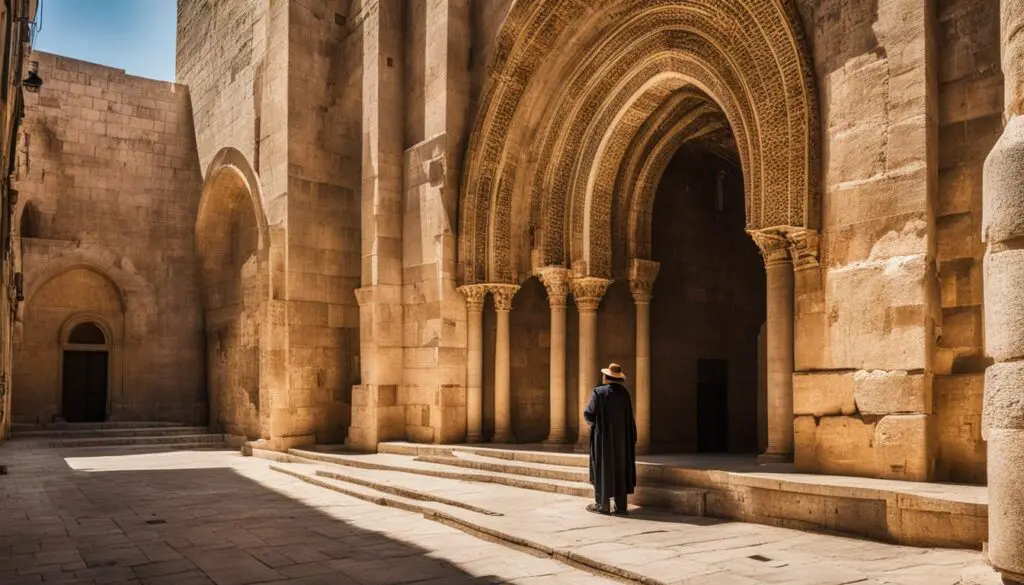
Conclusion
Embarking on a spiritual journey to the Church in Jerusalem is a profound and transformative experience. It allows individuals to deepen their connection with their faith, explore the roots of Christianity, and witness the rich tapestry of religious history. The sacred sites of Jerusalem hold immense significance, and pilgrims from around the world are drawn to these holy places to seek spiritual solace and inspiration.
From the origins and founders of the Church in Jerusalem to its key beliefs and doctrines, the historical significance, denominational splits, leadership and governance, worship practices, contemporary influence, and current world membership numbers, the Church in Jerusalem encompasses a diverse range of aspects that contribute to its significance and allure. This spiritual journey invites believers to immerse themselves in the traditions and stories that have shaped humanity for generations.
Whether you choose a self-guided tour, a day tour, or a comprehensive tour package, the Church in Jerusalem offers a once-in-a-lifetime opportunity to connect with ancient history, retrace the footsteps of biblical figures, and experience the awe-inspiring beauty of this ancient land. So, pack your bags and embark on an unforgettable spiritual journey to the Church in Jerusalem, where faith and history converge.
FAQ
What are the sacred sites in Jerusalem associated with the Church?
The sacred sites in Jerusalem associated with the Church include the Western Wall, the Church of the Holy Sepulchre, and the Dome of the Rock.
Who were the founders of the Church in Jerusalem?
The founders of the Church in Jerusalem were the apostles, who spread the teachings of Jesus and established the first Christian community in the Holy City.
What are the key beliefs of the Church in Jerusalem?
The Church in Jerusalem shares the core beliefs of Christianity, including the belief in the Holy Trinity, the divinity and messiahship of Jesus, salvation through faith in Jesus, and the importance of the Bible as the sacred text.
What is the historical significance of the Church in Jerusalem?
The Church in Jerusalem holds immense historical significance as the birthplace of Christianity, being the city where Jesus carried out His ministry, performed miracles, and was crucified, buried, and resurrected.
How many Christian denominations are present in Jerusalem?
There are various Christian denominations present in Jerusalem, including the Greek Orthodox Church, the Roman Catholic Church, the Armenian Apostolic Church, the Coptic Orthodox Church, and the Ethiopian Orthodox Church, among others.
How is the Church in Jerusalem governed?
The Church in Jerusalem is divided among various Christian denominations, with each denomination having its own hierarchy led by a patriarch or bishop who oversees spiritual affairs.
What are the worship practices in the Church in Jerusalem?
Worship practices in the Church in Jerusalem include prayers, hymns, liturgies, sacraments such as baptism and communion, and pilgrimages to the sacred sites.
What is the contemporary influence of the Church in Jerusalem?
The Church in Jerusalem serves as a spiritual center for Christians worldwide, attracting pilgrims and tourists, fostering interfaith dialogue, and contributing to the local economy through religious tourism.
What is the current membership number of the Church in Jerusalem?
The exact membership numbers of the Church in Jerusalem are difficult to determine, but the Christian population in Jerusalem represents a significant minority, comprising a small percentage of the overall population.
What are the different options for exploring the Church in Jerusalem?
Pilgrims visiting Jerusalem’s sacred sites have options for self-guided tours, day tours with expert guides, or comprehensive tour packages that take care of all logistics and provide visits to multiple sacred sites.
How can a spiritual journey to the Church in Jerusalem be described?
Embarking on a spiritual journey to the Church in Jerusalem is a profound and transformative experience that allows individuals to deepen their faith, explore the roots of Christianity, and witness the rich tapestry of religious history.




